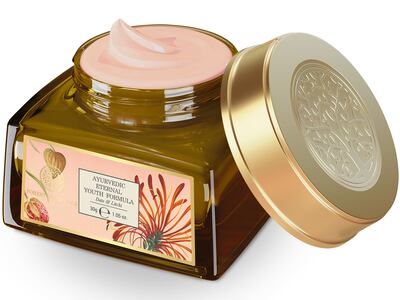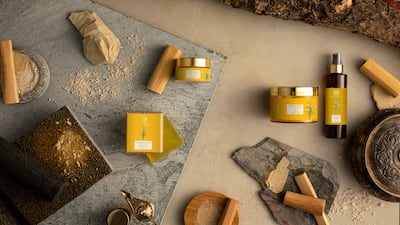The first thing you notice about Mira Kulkarni, 67, is the meditative calm she exudes.
Her skin glows, as if lit up by lamps from the inside – which is perhaps not surprising as she is the founder and managing director of Estee Lauder-backed luxury Ayurvedic skincare brand Forest Essentials.
Kulkarni's first Forest Essentials store in the UAE launched at Dubai Hills Mall this month. On offer is its signature 24k gold-infused Soundarya range, which comprises a serum, night cream, body milk, body oil, shower wash and soap.
“That was always the plan. The East understands the traditional aspect of beauty. It’s prevalent in the culture of the UAE,” she says.
“We already have substantial online sales from the Middle East and the connection will become deeper when our audience will be able to see, smell, touch and sample our products. We’re looking at up to 10 stores across the Middle East within this year itself.”
However, Kulkarni’s has not always been a journey of aggressive and rapid expansion. Forest Essentials started 23 years ago in a garage office, a boutique company offering candles and soap.
At 28, a single mother of two, Kulkarni lost both her parents in quick succession. A power cut while she was on holiday sparked a curiosity about candle-making, which snowballed into a passion for handmade soaps. It was at this time she came to the startling realisation that despite being the home of Ayurveda and thousands of indigenous herbs, India was not even scratching the surface when it came to using that knowledge in day-to-day life.
“The fundamental principle of Ayurvedic skincare is that it is preventative. Looking after the skin naturally is a process that needs to start from adolescence, unlike a remedial approach that only starts once the skin starts showing signs of ageing or damage. Starting early and staying consistent makes all the difference.”
Next came the part about unearthing lost recipes and ingredients, and learning from traditional practitioners of Ayurveda, many of whom lived in forests and on hills across the country.
It was during this time that Kulkarni hit up a philosophy that would help Forest Essentials become a luxury brand that offers close to 200 products across 147 stores and 440 spas in more than 100 countries. Ancient Indian recipes had been lying in wait for centuries for someone to come along and use them, but to create a niche for herself she needed to formulate products that “felt pleasurable, tasted delicious, and smelt divine”.

Eastern cultures have been turning to everyday ingredients found in nature for beauty and wellness purposes since time immemorial. Mothers and grandmothers often whip up face packs and poultices to beautify and heal the skin from ingredients found in the larder. Charred almonds have been used as natural kohl; camel milk is employed for moisturising and tightening the skin; labneh for sunburns; rose water for toning; fig pulp as a DIY face mask; and aloe gel for soothing the skin is now part of practically every culture around the world.
Plenty of other Ayurvedic and eastern-inspired skincare brands are available in the UAE, including Mauli, Ranavat and Rituals. In many ways, such brands and products are not just vying for space with each other, but with the humble ingredients found in many a household.
Kulkarni prefers to think of this as an opportunity instead of competition. “If someone knows where you’re coming from, what you’re trying to say, why it is important to do, and is culturally connected to it in an elemental way – it is easier, actually, because you’re not imposing a thought process. You’re just reflecting to them what they already know and believe in,” she says.
Part of the trust-building process is introducing product lines created specifically for the GCC considering its climate, and the needs and preferences of beauty seekers in the region. “It’s for those who are partial to sophisticated skincare and attuned to fragrances,” Kulkarni says of the line that will launch in September.
Purity and authenticity are concepts that feature heavily in our conversation. The brand’s philosophy is that it’s good enough for the skin only if it’s good enough to be eaten.
“When we started, natural beauty was just not a thing. We weren’t even looking to build a big brand, to be honest. We were just looking to create products we’d be comfortable using ourselves. So for the first 12 years, we had no marketing, no influencers promoting us. It kept us focused on making Forest Essentials the cornerstone of trust, which is a legacy I’ve protected very carefully,” says Kulkarni.
Accordingly, the website uses the words pure, fresh and natural over and over again. And yet, in a world filled with a cacophony of brands screaming themselves hoarse to establish their own organic, clean, vegan and eco-friendly credentials, is being pure, fresh and natural enough of a competitive advantage?
“It’s unfortunate that these words have been abused to the point that they’ve stopped meaning anything. For me, it’s not a tagline or marketing gimmick, it’s just a way of being. I don’t know how to not be connected to nature or care about the purity of ingredients. The indiscriminate use of such words makes me cringe. But there’s little anyone can do except know that campaigns end, values don’t.”

